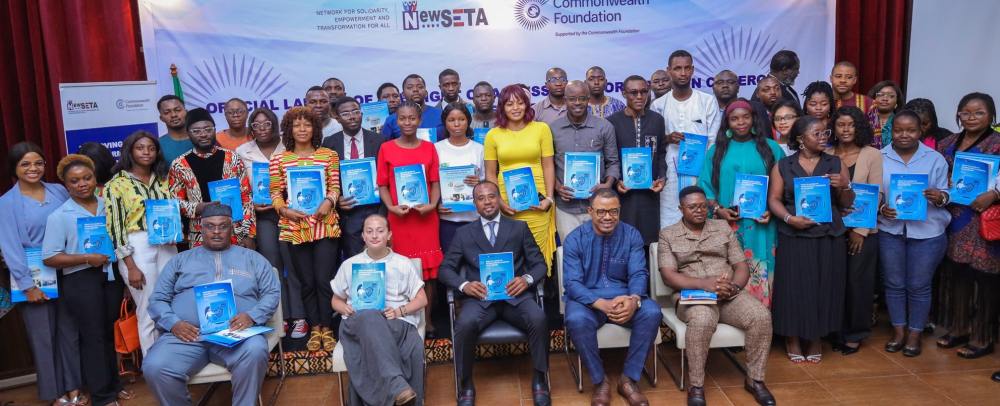Right To Public Information : So That Citizens May Enjoy Unfettered Access
- Par Kimeng Hilton
- 11 déc. 2024 12:10
- 0 Likes

The findings and recommendations of a study undertaken by the charity, NewSETA, with the support of the Commonwealth Foundation, were presented to the public in Yaounde on December 10, 2024.
The Network for Solidarity, Empowerment and Transformation for All, NewSETA, on December 10, 2024 in Yaounde launched the report of a study on “The Right of Access To Information In Cameroon, RAIC.” Which was conducted from 2023-2024 in all of Cameroon’s 10 administrative regions. The research was funded by the Commonwealth Foundation. The theme of the event was “Improving Access To Information In Cameroon Through Research, Advocacy And Legal Reforms.”
Why The Study?
Presenting the highlights of the report and recommendations before launching it, NewSETA Executive Director, Ateki Seta, said 382 people participated in the study, with 286 respondents. Seta explained the study was necessitated by the “untidy” nature of Right To Information, RTI laws in Cameroon – “...which exist in bits and pieces here and there.” Also, there is no standard Access to Information Act. Rather, the laws are dispersed patchwork of legislation.
Fall Short Of True Access
Meanwhile, there are various statutes in Cameroon on press freedom. Such as the preamble of the Constitution 35 (2), the 1990 Law on Social Communication Article 49, 1996 Law on Environmental Management, 2000 Law on Archives, 2024 Law on Town Planning, and the 2018 Law on Fiscal Transparency in government’s management of affairs. However, there are contradictions between some of these laws. Members of Parliament have the unreserved right to information. “But there is some ambiguity - can someone appeal the rejection of their right to information?” Ateki questioned.
Great Demand For Access
Concerning the institutions responsible for implementing the law in Cameroon – gendarmes, police and the judiciary - 98.9 per cent of journalists during the study said they had challenges accessing information from them. Especially as gendarmes, police and the judiciary have no legal obligation to hand over or disclose information to journalists. Some 91 per cent of respondents said they were unable to appeal the rejection of their requests for access to information. While 87 per cent of the respondents were agreed on the need for an Access To Information, law in Cameroon. In a similar development, the research found out that it was easier to get information from public officials in rural areas than those in urban areas.
Key Recommendations
Based on the foregoing findings, the research made key recommendations. That a comprehensive Freedom Of Information Act, FOIA law be developed and enacted. There be effective information management in public offices. Procedures for requesting information from public offices be standardised and a maximum response time to such requests set. That education and sensitisation be stepped up for citizens to better understand Freedom Of Information Act and the Right To Information, RTI requirements.
Standardise Access Cost
That an action plan for FOIA and RTI be developed. Set a fee structure (cost) for accessing different types of information. And put in place safeguards to protect from all forms of harassment, females who go to public offices to request access to information. Finally, the study recommends the setting up of a National Right To Information Action Plan.
Possible Policy Options
The presentation and launch of the report was followed by a panel discussion by experts on “Strengthening Cameroon’s Access to Information Rights: Exploring Policy Options.” Moderated by Abong Bebey Blaise, the panel comprised Mr. Denis Alain Mbezele, the Director of Communication with the National Communication Council, NCC; Mr. Denis Omgba, representing the Ministry of Communication; Dr Sakah Bernard, a Peace and Governance expert; Miss Sofia Porco, a Sociologist from the United States of America, and intern with NewSETA. It was followed by questions and answers.
Target Of Study
Meanwhile, the study on The Right of Access to Information in Cameroon, RAIC targeted public and para-public institutions, journalists and the civil society. At the launch of the report, organisers stressed that the right to information is very much dependent on the right to freedom of expression. Some 382 people participated in the research, while 286 people from all of Cameroon’s 10 administrative regions served as respondents. It should be noted there is yet no Access To Information law in any country in Central Africa. Worldwide, there are 133 countries with Access To Information statutes.
Reviewing Access, Legal Framework
NewSETA, with support from the Commonwealth Foundation conducted the research which envisaged several improvements in access to information and the legal framework on social communication in Cameroon. More specifically, the project examined existing media laws, identified limitations on access to information and provided specific recommendations. For developing and implementing media laws in compliance w...
Cet article complet est réservé aux abonnés
Déjà abonné ? Identifiez-vous >
Accédez en illimité à Cameroon Tribune Digital à partir de 26250 FCFA
Je M'abonne1 minute suffit pour vous abonner à Cameroon Tribune Digital !
- Votre numéro spécial cameroon-tribune en version numérique
- Des encarts
- Des appels d'offres exclusives
- D'avant-première (accès 24h avant la publication)
- Des éditions consultables sur tous supports (smartphone, tablettes, PC)













Commentaires